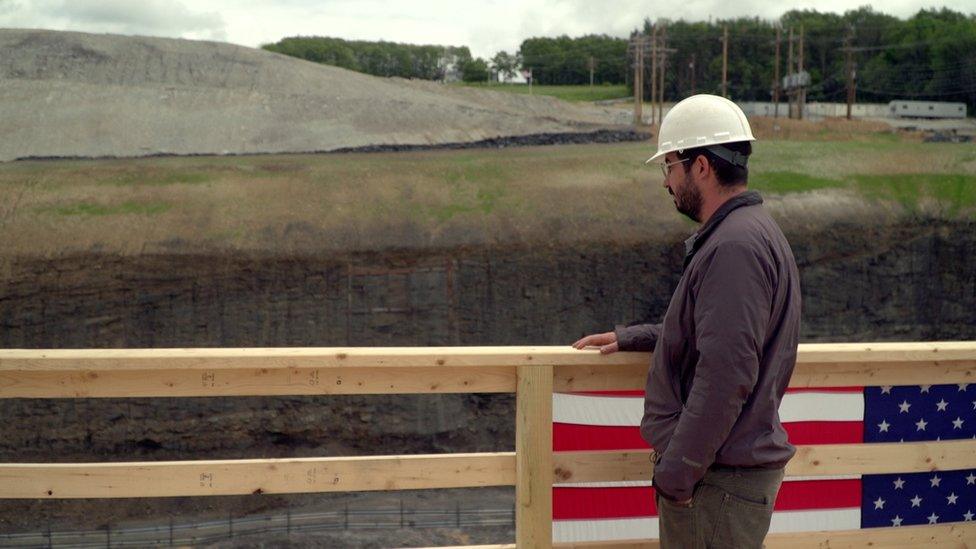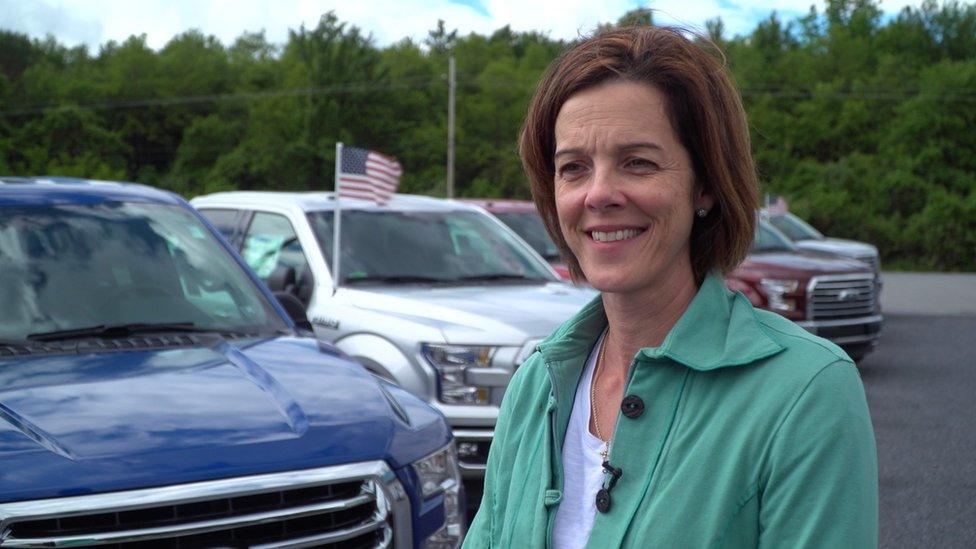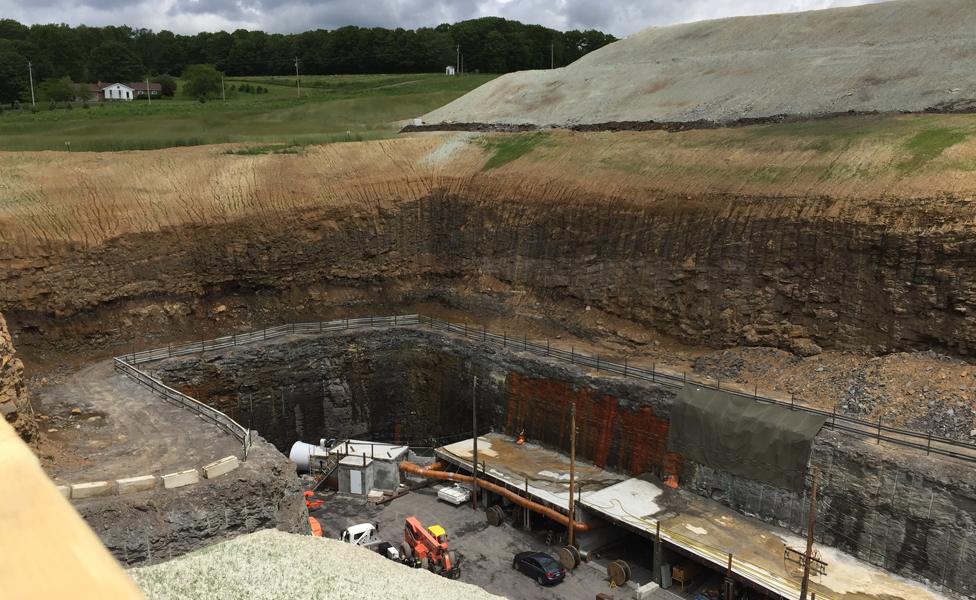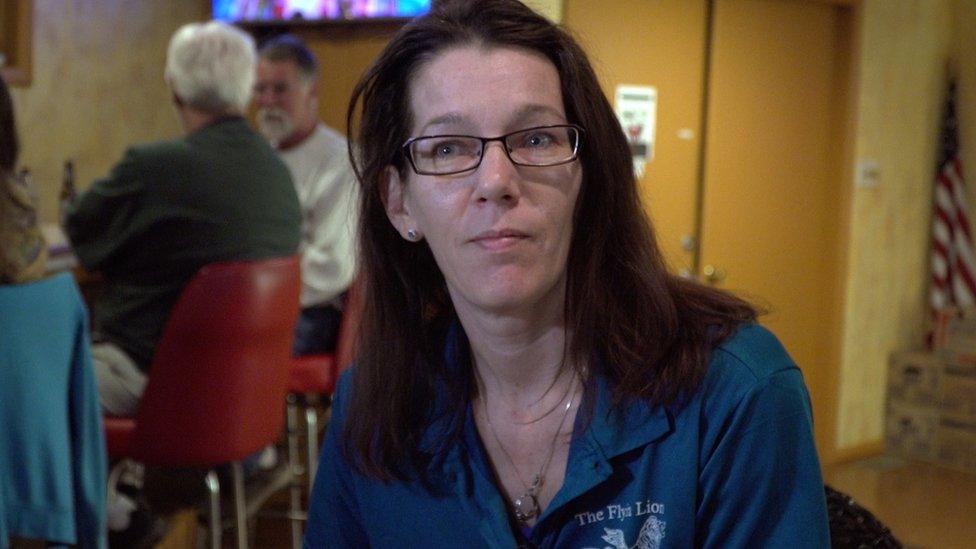Acosta mine: Are coal jobs returning to the US?
- Published

At Lisa Maurer's Ford dealership in Somerset County, Pennsylvania, trucks are her bread and butter. When a young person lands his first well-paying job, one of the first things they do is buy a pick-up. The trucks are useful for navigating the rugged Allegheny Mountain terrain and the intense snowy winters.
"It's kind of part of the culture here," says Maurer.
So it was clear to her how bad things had gotten two years ago, when young coal miners she'd sold brand new trucks to just a day or two earlier started bringing them back. At the time, it seemed like a new coal company was declaring bankruptcy every week and the laid-off miners weren't able to make the payments.
But now, for the first time in roughly seven years, a brand new coal mine is opening in Somerset County - the Acosta deep mine, just three miles from Maurer's dealership.
"We're hopeful - it means we're going to have things happening again," she says. "Everybody's excited."
Maurer has deep roots in coal. Her great-great grandfather emigrated from Slovakia to work in the mines, her grandfather and father opened their own mines, and now her 29-year-old son operates machinery in a mine. In 2002, her brother-in-law was one of nine men who were trapped for three days in a flooded mine shaft 240 feet under the ground. Miraculously, they all survived - some even went back to work.

Mining in Somerset County goes back a century and a half. Some of the tiny towns that dot the rolling, lush hillsides have identical houses, built decades earlier by coal companies for their workers. Though the towns are spread out with expanses of farmland separating them, it's a tight-knit community where everyone can feel when times are good for their neighbours or when they are very, very bad.
"Small things impact the economy here … it all swims around," says Tina Buckham, owner of the Flyin' Lion Pub & Eatery in Jennerstown, about five miles from the mine. "Everybody has family that works in coal, honey."
Thanks to a combination of factors, particularly fracking and the low price of natural gas, the coal industry hit a 30-year production low in 2015. Some believe that in addition, the Obama-era climate regulations caused a crisis of confidence in investors. Coal companies started going bankrupt. Mines shut their doors. And the effects rippled through the community - trucking companies laid off their drivers. Two restaurants - local institutions - shuttered. The Maurer dealership changed its inventory from new to more used vehicles.

"It was like a switch was flipped," says Maurer. "The last few years have been really tough and sad. There's a little glimmer of hope now."
The brand new Acosta Coal Mine is a 120-foot-deep rectangle gouged out of a south-facing hillside looking down on the valley below. Near the base is a stripe of jet black coal that the mine's parent company, Corsa Coal, will sell for metallurgical purposes - producing steel - rather than for energy production.
"We're putting a lot of people to work here," says Ben Gardner, the mine engineer, who says at its peak the mine could employ as many as 150 people. "That's 150 families all with a very good job to support them - myself included … It definitely helps for places that were hit by the hard times."
Two days before it's set to open, federal and state inspectors in hard hats take a final look at the operations at the bottom of the pit. A centipede-like piece of equipment called the continuous miner sits silent and still beside them, ready to chew through the coal seam that runs from the mouth of the mine and underground for nearly eight miles. When it's fully operational, Corsa projects the mine will produce 400,000 tonnes of coal a year.
At the lip of the mine is a wooden platform that looks down into the pit, built especially for a cookout and a ribbon-cutting ceremony set to take place on 8 June. There's an American flag nailed to the front, and tucked away underneath, a handwritten poster that reads, "TRUMP TOWER" - someone's idea of a joke, Gardner says.
On 1 June, in an address to the nation from the Rose Garden, President Donald Trump formally announced the US withdrawal from the Paris Climate Accord. Sandwiched between his criticisms of the deal and other member countries for supposedly cheering the US' "economic disadvantage", Trump made an off-hand comment about Acosta.
"The mines are starting to open up. We're having a big opening in two weeks," he said. "For many, many years, that hasn't happened. They asked me if I'd go. I'm going to try."
Can coal make a comeback in the US?
Although it's unlikely that the president will make an appearance on that wooden platform, Maurer was surprised and elated when she heard his remark.
"That was huge, everyone was caught off-guard," she says. "We feel like we've been thrown away. Our children don't matter, our grandchildren don't matter. And when Trump mentioned us, that was awesome."
Although the mine has been in the works for years - Corsa Coal obtained its permits in 2013 - the company says investors feel more comfortable putting their money into coal because of new administration.
The mine is projected to hire between 70 to 150 workers - sceptics say that's just a drop in the bucket when you consider the hundreds of lay-offs which took place over the last several years. However, it's also the first bit of good news in the industry that Somerset County residents have received in a long time.
Doug Miller, a controller at James F Barron Trucking which primarily transports coal, says for the first time in years, they're hiring instead of laying drivers off.
"We know we're going to have a future here," he says.
Electrical contractors, cement layers, excavators and lumberyards have already been put to work thanks to the new mine. Proponents are fond of saying that a single mining job creates four others throughout the community - waitresses and gas station attendants, housekeeping staff at the hotels in Somerset and ski instructors at the area's three ski resorts.
But mixed in amongst the optimism are people who've been battered and bruised by layoffs and industry uncertainty, who don't want to rely on the mercurial global markets, or the whims of a presidential administration to dictate whether or not they'll have food on the table.
One coal miner who asked to BBC to omit his name says he was laid off after more than 20 years in the industry and that he would not take a job at the new mine even if they offered it to him.
"I'll move away from here and go do something, I'm not afraid," he says.
He worries for a friend he knows who got one of the new jobs at Acosta.
"I'm really glad he has a job there, he has three, four kids," he says. "But you know, you look him in the eye and he knows he's two pay checks away from everything being gone."
People like restaurant owner Tina Buckham are also sceptical of the idea that there is a great resurgence of the coal industry on the horizon, and nervous about her own razor-thin margins. Although she would love to see all the old mines open up their doors, she's more concerned about the lack of infrastructure in the area - the sole internet provider and the sometimes spotty mobile service.

"We have great, hardworking guys and women - they just want good jobs. So we need to have the infrastructure in place to attract the jobs," she says. "I don't think that the whole community is thinking this is the only thing that we can do here. We can do a lot of stuff because we have a lot of really great people."
And unlike some of the younger people and out-of-work miners who've decided to pick up their roots and seek a better life elsewhere, Somerset County is Buckham's home. She's lived in the area her whole life. Her neighbours as a kid are still her neighbours today.
"I'm here on purpose, in this little town. I like it," she says. "I'm hoping I survive it, but I like it."
Back at the car lot, Maurer is hoping Acosta means good things for her bottom line.
"There's a feeling that things are going to get moving again there are signs that the interest is coming back," she says. She feels "cautiously optimistic" but hasn't made any plans to bring in new inventory or hire more staff.
"To get to where we feel comfortable, we've got to get more than one mine opening," she says.